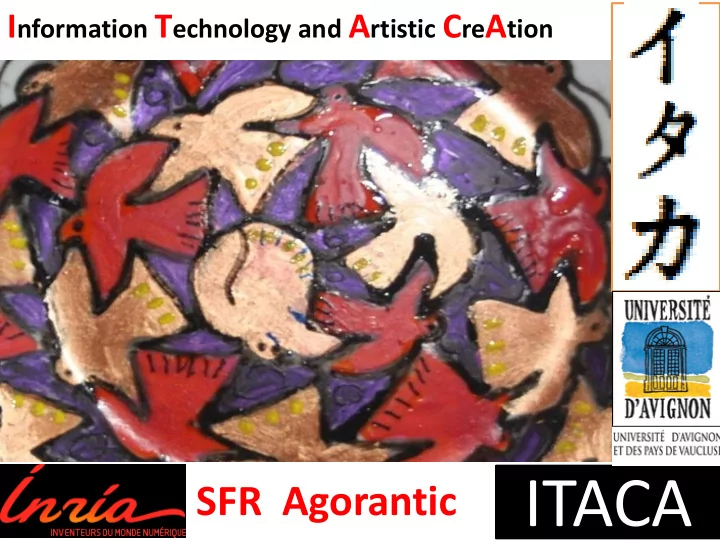

I nformation T echnology and A rtistic C re A tion ITACA ITACA SFR Agorantic
Mediathor: Multimedia Creation Instrument Feedback Audio Voice Synthesizer Intelligent Music Interfaces Video Synthesizer Movement detection Feature Impact Extraction INPUTS Control
Example of existing “ Mediathors ”: Max, Jean Claude Risset: • instrument allowing live interaction between a pianist and a computer playing the same acoustic piano and which reacts to the pianist. • The piano is connected to the Max music programming environment running on a Macintosh II computer, a program developed in the 80’s by the composer. It allows the user to define how the computer should react to the pianist. • C1 based on this instrument was composed and performed on 1989 [C1] Risset, Duet for One Pianist Eight Sketches for MIDI Piano and Computer, 1989
Intelligent Interface • The synthesizer part typically requires interactive gesture control of sound patterns [C2], which may require coding of features in order to control sound as a function of the code [C3]. {C2} Alistair Riddell, Towards Interactive Gesture Control of Sound Patterns Using the Wiimote, In Proceedings of the ACMC’07 Conference. ANU. Canberra. June 19th. 2007 {C3} Alistair Riddell, Gesture and Musical Expression Entailment in a Live Coding. Context In the proceedings of the ACMC'09 conference. QUT Brisbane. July 2-4. 2009
Reacting to Speech • Most of speech processing applications aim to extract, from a speech signal, some high level descriptors related to linguistic or semantic content, the language, the speaker identity or his emotional state, etc. • speech processing consists in modeling relationships between concepts, intents, the linguistic and acoustic levels [BBF]. We shall use these features when the input for MediaThor is speech signals (e.g. a theater show). [BBF] F. Bimbot, J. Bonastre, C. Fredouille et al, "A tutorial on text-independent speaker verification", EURASIP Journal on Applied Signal Processing, 2004(4):430-451, 2004.
Reacting to music • Even if the role of concepts or intents clearly differ in speech and music, many analogies have been recently investigated, both on linguistics and expressivity of speech and music [M1,M2,M3] [M1] J. T. Hogan, ``A parallel between music and speech : Tonality and tone'', Linguistica atlantica, v. 20, pp. 73-84, ISSN 1188-9322, Memorial University of Newfoundland, Linguistics Department, St. John's, NF, CANADA. [M2] Ray Jackendoff, ``Parallels and Nonparallels between Language and Music'', Music Perception, volume 26, n 3, pp 195-204, 2009. [M3] ``Analyse et modèle génératif de l'expressivité. Application à la parole et à l’interprétation musicale'', PhD Thesis, Université de Paris 6 - IRCAM, Unité mixte UMR IRCAM-STMS, 2009 • In this project, we propose to study how these analogies may be used as tools for music creation and concretely integrated into a MediaThor for handling music input signals or for synthesizing music or sound.
Reacting to movement • At INRIA there are sensors that can detect the location of the hands and feet, as well as where one looks [Jean Christophe Lombardo] which is done by wearing glasses.
Video Synthesizer: Boids • Beautiful shapes and patterns that change in time are obtained by flock of birds or of fish. • A systematic way to synthesize movement of flocks using computer graphics has been proposed by Craig Raynolds (http://www.red3d.com/cwr/) after discovering that the complex macroscopic group movement is determined by three simple “microscopic” rules • Boids try to fly towards the centre of mass of neighbouring boids. • Boids try to keep a small distance away from other objects (including other boids). • Boids try to match velocity with near boids.
Objectives • 1: Controlling the boids: design a module that changes dynamically parameters of the above rules in reaction to features of voice or music. • 2. We have programmed boids with obstacles, will program boids with attractors. The input will control the location or effects of the obstacles. • 3. Program an avatar whose behavior is determined by the output of the interface
Objectives (continuation) • 4 Export the work to the immersive space at INRIA (3D and virtual reality)
AUDIO SYNTHESIZER 1 for BOIDS • We plan to create an audio tool to associate voice to each bird. The voices will be controlled too by codes obtained from extracted features. This means more than 1000 individual voices. • The equipment at the lab of virtual reality allows upto around 3000 boids. • We may develop a composition graphic tool for notation purposes. The notation can be related to that used for clusters, see e.g. Krzysztof Penderecki (1960)
Examples prix de Threne pour la memoire des victimes de Hiroshima (Penderecki, 1960)
• In this example, a huge cluster is c reated by gradually inserting inistruments
• The examples suggest what we can do with boids using Mediathor. In particular, the output of the intelligent interface can control the density of clusters, the pitch (glissandi) etc
A random syllable audio synthesizer • We plan to develop a synthesizer that generates random sequences of syllables. • Each syllable is pronounced and recorded in various versions, differing in parameters such as pitch, volume, duration, mode (whisper, shouts, etc). • Syllables will be classified to perception classes (eg syllables with at most one consonant will appear in one class and those with many consonants, in another). • The output of the intelligent interface together with the impact control will determine which version of a syllable will be used as well as from which class will the syllable be chosen.
Example of Syllable based poetry: Ursonate of Kurt Schwitters The syllables are used for their phonetic expression rather than their linguistic meaning. For other references see www2.cndp.fr/themadoc/poesie_sonore/genealogie.htm
Potential added value of our project • The potential added value of the project is in the state of the art knowhow of LIA (UAPV) in techniques for speech recognition and analysis, some of which are useful for music as well • The use of virtual reality in performance and in creation
Recommend
More recommend